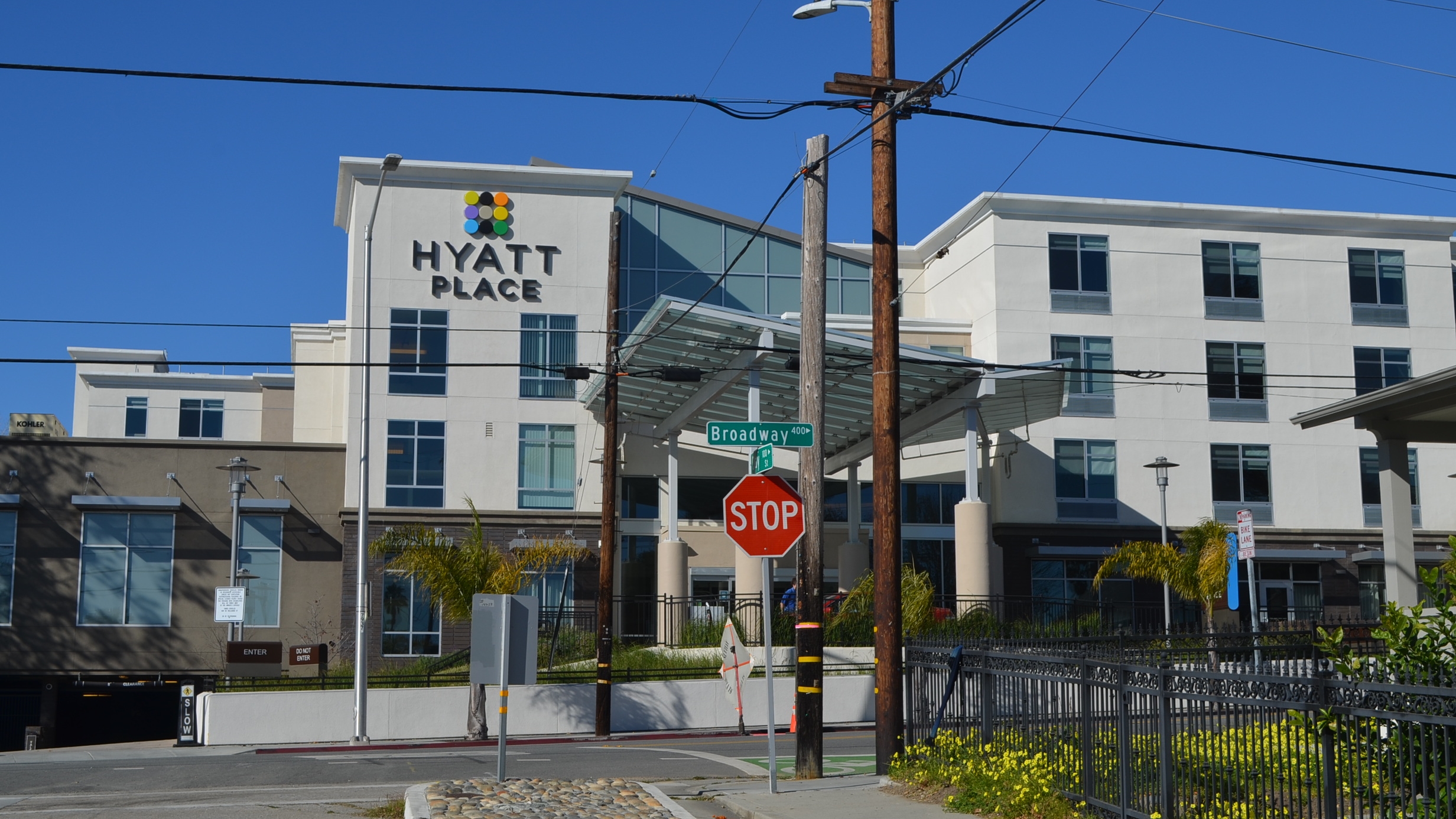Read Santa Cruz Local's Election Guide

If Measure P is adopted by voters in the Nov. 8 election, a tax on hotel rooms would increase to 12% from 11%. The Hyatt Place hotel at 407 Broadway in Santa Cruz has 106 rooms. (Stephen Baxter — Santa Cruz Local file)
What is Measure P?
Measure P would raise taxes on hotel rooms, motel rooms and short-term rentals in the city of Santa Cruz.
What would Measure P do?
- Increase the tax on hotels and motels to 12% from 11% and increase the tax on short-term rentals to 14% from 11%. The increases are identical to those approved by Santa Cruz County voters in June for unincorporated county areas.
- Bring in about $1.4 million each year, according to preliminary estimates. The money would be used as “flexible funding” that could support city services including wildfire prevention, public safety and affordable housing, said Santa Cruz Mayor Sonja Brunner. However, the proposal does not legally tie the money to a specific service.
- The measure needs more than 50% of the vote to pass. If approved by voters, the new taxes would start Jan. 1.
What does a “yes” vote mean?
A “yes” vote would allow tax increases on hotel rooms, motel rooms and short-term rentals in the city of Santa Cruz.
What does a “no” vote mean?
A “no” vote would keep the tax rate at 11% for hotels, motels and short-term rentals in the city of Santa Cruz.
Things to consider about Measure P
The measure would help the city maintain services after Santa Cruz city voters rejected a sales tax hike in the June 7 election. Measure F, the proposed sales tax increase, would have provided more revenue for the city.
In February, the city’s interim finance director said the city faced a “structural deficit” that would drain its reserves by 2028 without another source of income. Santa Cruz’s budget problems predate the COVID-19 pandemic and are partly caused by rising pension and health care costs for public employees, former city finance directors have said.
An increase to the occupancy tax was considered in 2019, but the idea was put off when the COVID-19 pandemic slowed the hospitality industry, Santa Cruz City Councilmember Sandy Brown said in a council meeting in August. “It’s been 10 years since the (transient occupancy tax) has been raised,” Brown said. “I think that given the challenges that the hotel industry has faced, this is a very measured proposal.” Brown, Mayor Sonja Brunner and Vice Mayor Martine Watkins proposed the measure in July.
Homeless services provider Keith McHenry said in August that the tax increase would make hotels more expensive for the unhoused. “Not everybody that uses the hotels and motels here are out of town tourists,” said McHenry. “Many of the people who live outside do get one or two nights a month for the purposes of a shower because they can’t get one any other way.”
Casey Beyer of the Santa Cruz County Chamber of Commerce said in August that local hoteliers are “deeply concerned” that the increase could impact their ability to attract corporate groups that come in the tourist off-season. Many in the industry were surprised the city hadn’t reached out to discuss the potential hike, Beyer said.
Editor’s Note: Below is Santa Cruz Local’s original story about a proposed Santa Cruz hotel tax that was published Aug. 9, 2022.
Santa Cruz hotel tax hike heads to November ballot
By Jesse Kathan
Aug. 9, 2022
SANTA CRUZ >> A measure that would raise taxes on hotels and short-term rentals in the city of Santa Cruz will appear on the November ballot, the Santa Cruz City Council decided Tuesday evening.
The measure would:
- Increase the tax on hotels and motels to 12% from 11% and increase the tax on short-term rentals to 14% from 11%. The increases are identical to those approved by Santa Cruz County voters in June for unincorporated county areas.
- Bring in about $1.4 million each year, according to preliminary estimates. The money would be used as “flexible funding” that could support city services including wildfire prevention, public safety and affordable housing, said Santa Cruz Mayor Sonja Brunner. However, the proposal does not legally tie the money to a specific service.
The measure is meant to help the city maintain services after voters rejected Measure F in June. That measure would have raised the city’s sales tax. In February, the city’s interim finance director said the city faced a “structural deficit” that would drain its reserves by 2028 without another source of income.
Santa Cruz’s budget problems predate the pandemic and are partly caused by rising pension and health care costs for public employees, former city finance directors have said.
An increase to the occupancy tax was considered in 2019, but the idea was put off when the COVID-19 pandemic slowed the hospitality industry, said Santa Cruz City Councilmember Sandy Brown. “It’s been 10 years since the (transient occupancy tax) has been raised,” Brown said. “I think that given the challenges that the hotel industry has faced, this is a very measured proposal.” Brown, Brunner and Vice Mayor Martine Watkins proposed the measure last month.
During public comment, homeless services provider Keith McHenry said that the tax increase would make hotels more expensive for the unhoused. “Not everybody that uses the hotels and motels here are out of town tourists,” said McHenry. “Many of the people who live outside do get one or two nights a month for the purposes of a shower because they can’t get one any other way.”
Casey Beyer of the Santa Cruz County Chamber of Commerce said local hoteliers are “deeply concerned” that the increase could impact their ability to attract corporate groups that come in the tourist off-season. Many in the industry were surprised the city hadn’t reached out to discuss the potential hike, he said. “We understand that the city has to find revenue to provide the city services that the community wants,” Beyer said. “My question is, did the city do any real outreach to the hotel industry before making this decision?”
Because the Measure F city sales tax hike failed in the June election, city leaders considered ways to raise revenue and conducted outreach on a “condensed time frame,” said Santa Cruz City Manager Matt Huffaker.
“I think the real engagement will begin and continue most certainly, if we vote to place this on the ballot,” said Mayor Sonja Brunner. “There is a lot of discussion and engagement with the hoteliers, with Airbnb, property owners and various community members.”
The ballot measure would need more than 50% of the vote to pass. If approved by voters, the new taxes would start Jan. 1.
The city council voted unanimously to:
- Request that the Nov. 8 ballot include a measure to increase the transient occupancy tax on hotels and short-term rentals.
- Direct the city attorney to prepare an impartial analysis of the measure and the city manager to prepare a fiscal analysis.
Questions or comments? Email [email protected]. Santa Cruz Local is funded by members, major donors, sponsors and grants for the general support of our newsroom. Our news judgments are made independently and not on the basis of donor support. Learn more about Santa Cruz Local and how it is funded.
Santa Cruz Local’s news is free. We believe that high-quality local news is crucial to democracy. We depend on locals like you to make a meaningful contribution so everyone can access our news. Learn about membership.
Jesse Kathan is a staff reporter for Santa Cruz Local through the California Local News Fellowship. They hold a master's degree in science communications from UC Santa Cruz.





